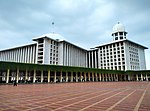
East Java is a province of Indonesia located in the easternmost third of Java island. It has a land border only with the province of Central Java to the west; the Java Sea and the Indian Ocean border its northern and southern coasts, respectively, while the narrow Bali Strait to the east separates Java from Bali by around 2.29 kilometres (1.42 mi). Located in eastern Java, the province also includes the island of Madura, as well as the Kangean islands and other smaller island groups located further east and the Masalembu archipelago to the north. Its capital is Surabaya, the second largest city in Indonesia, a major industrial center and also a major business center. Banyuwangi is the largest regency in East Java and the largest on the island of Java.

Pesantren is a traditional Islamic boarding school in Indonesia. It is thought either in private houses, a pondok or a mosque, the teaching includes classical Islamic texts and santri thought, taught by kyais. According to one popular tradition, the pesantren education system originated from traditional Javanese pondokan, dormitories, ashrams for Hindus or viharas for Buddhists to learn religious philosophies, martial arts, and meditation. Institutions much like them are found across the Islamic world and are called pondok in Malaysia, Southern Thailand and madrasas in India and Pakistan and much of the Arabic-speaking world. The pesantren aims to deepen knowledge of the Quran, particularly through the study of Arabic, traditions of exegesis, the Sayings of the Prophet, law and logic. The term pesantren derives from the root word santri or student -- pe-santri-an or the place of the santri.
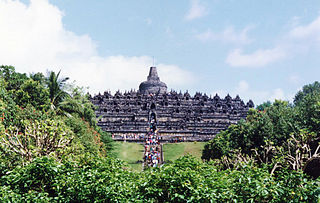
The Wali Songo are revered saints of Islam in Indonesia, especially on the island of Java, because of their historic role in the spread of Islam in Indonesia. The word wali is Arabic for "trusted one" or "friend of God", while the word sanga is Javanese for the number nine.
Malik Ibrahim, also known as Sunan Gresik or Kakek Bantal, was the first of the Wali Songo, the nine men generally thought to have introduced Islam to Java.
Sunan Kudus, founder of Kudus, is one of the Wali Sanga, of Java, Indonesia to whom the propagation of Islam amongst the Javanese is attributed.

Sunan Giri, and Muhammad Ainul Yakin is considered one of the Wali Sanga in Indonesia. His family is from Hussani Sayid, no historical evidence that he is from Qadiri family

The Demak Sultanate was a Javanese Muslim state located on Java's north coast in Indonesia, at the site of the present-day city of Demak. A port fief to the Hindu-Buddhist Majapahit kingdom thought to have been founded in the last quarter of the 15th century, it was influenced by Islam brought by Muslim traders from China, Gujarat, Arabia and also Islamic kingdoms in the region, such as Samudra Pasai, Malacca and Bani (Muslim) Champa. The sultanate was the first Muslim state in Java, and once dominated most of the northern coast of Java and southern Sumatra.
Sunan Bonang was one of the nine Wali Songo, along with his father Sunan Ampel and his brother Sunan Drajat who are said to have established Islam as the dominant religion amongst the Javanese, Indonesia's largest ethnic group.
Sunan Ampel was one the nine revered Javanese Muslim saints, or Wali Songo, credited with the spread of Islam in Java. According to local history, around Demak the mosque of Demak Masjid Agung Demak was built by Sunan Ampel in 1479 CE, but other sources attributed the construction of the mosque to Sunan Kalijaga.
Sunan Drajat was born in 1470 CE. He was one of the Wali Songo or "nine Saints", along with his brother Sunan Bonang and his father Sunan Ampel to whom is attributed the establishment of Islam as the dominant religion amongst the Javanese, Indonesia's largest ethnic group.
Pondok Pesantren Walibarokah Burengan Banjaran Kediri is a pesantren located in Kediri, East Java. Run by the Wali Barokah Foundation, the school was founded in 1950 by Nurhasan Al Ubaidah, who initially gave Koran recital lessons to 25 pupils at a mosque in the village of Burengan, Kediri district. Nurhasan later bought a house adjacent to the mosque, which developed into Burengan Banjaran Kediri Islamic Boarding School.

Raden Patah, also known as Jin Bun was the first sultan of the Demak Sultanate. Ascending to the throne in 1475, he remained a vassal of the Majapahit Empire until 1478. Raden Patah took the title Panembahan Jimbun after legitimizing the Sultanate of Demak as the successor state to the Majapahit Empire, with the Wali Sanga appointing him the Sultan of Demak.
The Duchy of Surabaya was a Javanese principality centered in Surabaya, on the northeastern coast of Java, that existed as an independent polity from c. 1546 to 1625. It became independent following the disintegration of the Demak Sultanate, and by the beginning of the 17th century had become the leading power in east Java and the most important port on Java's northeastern coast. Subsequently, it entered into decades of conflict with the Mataram Sultanate that ended in the victory of Mataram and the fall of Surabaya in 1625.

Pondok Modern Darussalam Gontor Ponorogo, also known as Pondok Modern Gontor, abbreviated as PMDG, or simply Pesantren Gontor, is a pesantren in Ponorogo Regency, East Java, Indonesia. Since its founding in 1926, the pesantren has become famous for the application of discipline, heavy emphasis on foreign languages, and strong network and cadre of alumni. It also has been an educational institution known for not being specifically tied to any political and social organization. The pesantren is considered the backbone of Muslim society in Indonesia, producing numerous leading figures in the history of Islam in Indonesia.

Kyai Hajji Zubair Dahlan was an Indonesian ulama of tafsir, fiqh, uṣūl al-fiqh, and tasawwuf from Rembang Regency, Central Java. Every year, in the month of Ramadan, Zubair always routinely teaches the Tafsir al-Jalalayn to his students. In addition, he also active in teaching branches of Arabic grammar and tawhid at the Pesantren Sarang. Zubair is the father of an influential cleric in Indonesia, Maimun Zubair, and a teacher of several Nahdlatul Ulama cleric such as Sahal Mahfudz, Bisri Syansuri, and others. Some of his students later became caregivers and leaders of famous pesantren in Indonesia, such as Pondok Pesantren Lirboyo, Pondok Pesantren Sidogiri, Pondok Pesantren Al-Falah Ploso, Pondok Pesantren Mranggen, and other pesantren.
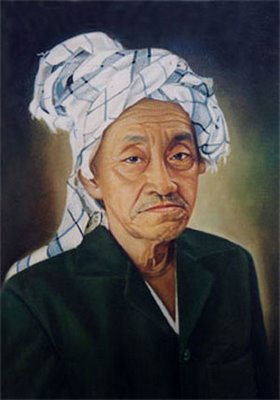
KHR. As’ad Syamsul Arifin was an Indonesian ulama and co-founder of Nahdatul Ulama. In 2016, he was declared a National Hero of Indonesia.

Giri Kedaton was an Islamic kedatuan located in Gresik, East Java and existed in the 15th to 17th centuries, until Giri was conquered by the Mataram Sultanate in 1636.
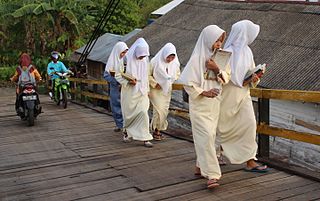
Kota santri is an epithet used in Indonesia, predominantly in Java, given to a region historically important in the context of Islamic education. The term santri generally means a Muslim student who studies at pesantren, an Islamic boarding school indigenous to the Indonesian archipelago.
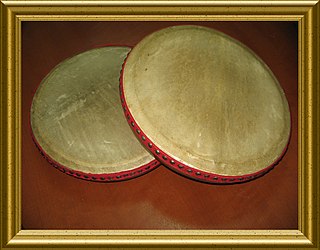
Kompang is a traditional Balinese and Javanese musical instrument part of gamelan in the percussion family originated from the Indonesian region of Ponorogo in East Java. Kompang has existed in Indonesia since at least the 8th century and has spread to various regions of Indonesia as well as the Southeast Asia in general, such as Singapore, Malaysia, Brunei and Thailand, which later became known as Kompang Jawa.













